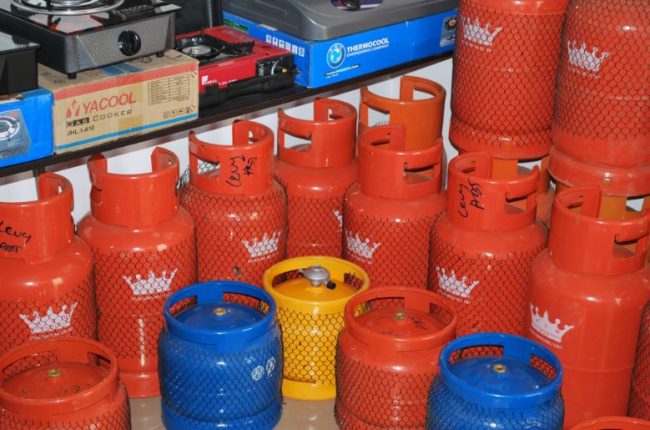The supply of Liquefied Petroleum Gas (LPG), also known as cooking gas for consumption in the country dipped by 26.8 percent in August amid soaring prices.
Data obtained by BizWatch Nigeria on Sunday from the Petroleum Products Pricing Regulatory Agency (PPPRA) showed that only 90,017 metric tonnes of the product were made available in August as against 123,029.79 MT in July this year.
The shortfall in supply from importers and local producers of the commodity, has pushed up the price of cooking gas by as much as 87.5 percent in the past eight months.
A gas plant in Lagos refilled a 12.5kg cylinder for cooking for N5,200 in July but now sells the same quantity for N6,000.
In June, 12.5kg of the cooking gas cylinder was refilled for N4,400 on June 17 as against N3,200 in December last year.
The price of cooking gas has been on a steady rise this year on the back of the devaluation of naira as more than 50 percent of the product is imported into the country.
In May, the Central Bank of Nigeria (CBN) devalued the naira as it adopted the NAFEX exchange rate of N410.25 per dollar as its official exchange rate. The naira traded at 545/$1 at the parallel market on Thursday.
READ ALSO: NNPC Gives Reasons For Spike In Price Of Cooking Gas
The PPPRA data showed that the LPG supplied for consumption in August was imported from three countries despite the huge gas reserves in the country.
Nigeria, which ranks as the ninth-largest natural gas reserve globally, imported 57,428.038 MT of cooking gas from the United States, Algeria and Equatorial Guinea in April.
Data obtained by BizWatch Nigeria from PPPRA showed that this represents 63.8 percent of the total gas of 90,017 MT supplied to consumers in the country in August.
Meanwhile, about 66,394.325 MT of the commodity was imported last month.
Producers were able to produce only 32,588.964 MT cooking gas in August compared with 56,635.469 MT in July.
This is despite that the country has about 202 trillion cubic feet of proven gas reserves and an additional 600 trillion cubic feet of unproven gas.
Reasons For Recent Cooking Gas Price Increase
The shortfall in gas supply was highlighted by the Group Managing Director of Nigerian National Petroleum Corporation (NNPC), Mallam Mele Kyari, as one of the reasons for the recent hike in the price of the commodity.
Kyari said the corporation was working with other agencies and a strategy has been developed to expand its sources in order to ensure gas is directly delivered to the homes of end-users.
“Today, this country is under-supplied with gas. I can tell you that we are having difficulty feeding our network across the country with gas, every day, it is a trouble to deliver gas. Once your supply is weak, it will affect pricing”, the NNPC GMD said.
“The supply mechanism of our LPG is very weak, that is why we are collaborating extensively to make sure that we are able to extract LPG from our gas resources so that it is made available to the market. Once supply becomes high, definitely, the price will definitely be impacted.”
READ ALSO: Marketers Express Worry Over Rising Price Of Cooking Gas
“We are transiting and we will continue to add more volume into the market so that we bring down the prices.”
One other reason for the recent hike is the re-introduction of Value Added Tax (VAT) on imported LPG, according to the Nigerian Association of Liquefied Petroleum Gas Marketers (NALPGAM).
The Executive Secretary of the association, Bassey Essien, stated the VAT was initially gazetted in 2019.
He stated, “It is unfortunate that the Federal Inland Revenue Service (FIRS) and the Federal Ministry of Finance have gone to resuscitate a product that has been exempted and gazetted from VAT.
“This was gazetted in 2019 and has encouraged domestic gas utilisation. Nigerians are already complaining about the prices of cooking gas across the country, and this would further worsen the situation.”
He warned that the initial objective of domestic availability will be defeated if cooking gas becomes too expensive for ordinary Nigerians.
Nigeria’s Gas Utilization Initiative
President Muhammadu Buhari earlier this year launched an ambitious plan called ‘Decade of Gas’ that aims to harness the gas reserves to power the economy by 2030.
Buhari, while speaking at a pre-summit gathering of the Nigeria International Petroleum Summit in Abuja, said the government will leverage the huge gas reserves to become not just a major exporter but a major gas consuming country.
“Our major objective for the gas sector is to transform Nigeria into an industrialized nation with gas playing a major role and we demonstrated this through enhanced accelerated gas revolution,” the president said.
Essien recently noted that even though the country produced four million metric tonnes of gas was being produced annually, only 350,000MT is allocated for use as cooking gas in the domestic market.
According to him, the regular importation of the product to bridge the production shortfall has affected the price of cooking gas in the country.
The Minister of State for Petroleum Resources, Chief Timipre Sylva, recently stated that the challenges in the sector were well understood and that the Petroleum Industry Bill (PIB) will provide a solution in transitioning towards a gas economy.
